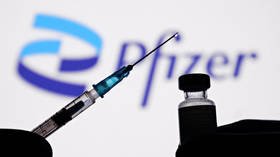Whistleblower exposes multiple issues with Pfizer’s Covid-19 vaccine trial

Leading medical journal The BMJ has published an incendiary report exposing faked data, blind trial failures, poorly trained vaccinators, and a slow follow-up on adverse reactions in the phase-three trial of Pfizer’s Covid jab.
Central to the exposé is Brook Jackson, who, for two weeks, served as regional director at Ventavia Research Group, the company contracted to assist with the pivotal trial. She provided The BMJ with dozens of internal company documents, photos, audio recordings, and emails supporting her concerns.
Jackson reveals that Ventavia staff who conducted quality-control checks were overwhelmed by the volume of problems they were identifying. She repeatedly informed her superiors of poor laboratory management, and patient safety and data integrity issues.
Also on rt.com CDC approves Pfizer’s Covid-19 vaccine for children aged 5-11In a cited internal document from August 2020, shortly after the Pfizer trial began, a Ventavia executive identified three site staff members with whom to “go over e-diary issue/falsifying data, etc.” One employee was said to have been subsequently “verbally counseled for changing data” and “not noting late entry.”
Jackson reported her concerns to the US Food and Drug Administration (FDA), but was fired later the same day on the basis that she was “not a good fit.”
In a recording of a late September meeting provided by Jackson, in which she met with two Ventavia directors, the unwelcome prospect of an FDA inspection had been openly discussed. “We’re going to get some kind of letter of information at least, when the FDA gets here … I know it,” one said to Jackson.
Another former Ventavia employee has confirmed that the company had been expecting a federal audit of its Pfizer vaccine trial, though this did not materialize. A 2007 US Department of Health report found that, between 2000 and 2005, the FDA inspected just 1% of clinical trial sites, while, in 2020, just 50 on-site visits were conducted.
In the aforementioned recording, an executive can also be heard explaining that, when examining paperwork for trial quality control, the company wasn’t able to quantify the types and number of errors that were being identified. “In my mind, it’s something new every day,” the senior staffer says. “We know that it’s significant.”
An email sent in September to Ventavia by Icon, the research organization with which Pfizer partnered on the trial, shows Icon was dissatisfied with Ventavia’s inability to keep up with data entry queries. Icon reminded Ventavia that “the expectation for this study is that all queries are addressed within 24 hours,” noting that more than 100 queries had remained outstanding for more than three days.
Among those queries were two cases in which test subjects had “reported with severe symptoms/reactions.” According to protocol, subjects experiencing grade-three local reactions – “severe” redness, swelling, or pain at the injection site – should have been contacted. Icon asked for confirmation as to whether contact had indeed been made, so as “to ascertain further details and determine whether a site visit is clinically indicated,” and that the subjects’ forms be updated accordingly.
The day after her meeting with her directors, Jackson submitted a complaint to the FDA. She listed a dozen issues she’d personally witnessed, including “participants being placed in a hallway after injection and not being monitored by clinical staff,” “a lack of timely follow-up of patients who experienced adverse events,” “protocol deviations not being reported,” “vaccines not being stored at proper temperatures,” “mislabeled laboratory specimens,” and the targeting by Ventavia of staff who reported these problems.
Jackson’s account has been reinforced by several former Ventavia employees who have either since departed or been fired from the company. An executive present at the September meeting has since apologized to her, assuring her that everything she had complained about was “spot-on.”
Two of those employees spoke anonymously to The BMJ, confirming broad aspects of Jackson’s complaint. One, who has worked on more than four dozen clinical trials during her career, said she had never experienced such a “helter-skelter” work environment as that she encountered during Ventavia’s Pfizer trial. She also confirmed that the problems pinpointed by Jackson had persisted at the company after her dismissal. For instance, in several cases, there hadn’t been enough employees to swab for infection all trial participants who reported Covid-like symptoms.
“I’ve never had to do what they were asking me to do, ever. It just seemed like something a little different from normal – the things that were allowed and expected,” the employee told The BMJ. “I don’t think it was good clean data [that the trial generated]. It’s a crazy mess.”
The second former employee echoed the first’s comments, describing the environment at Ventavia as unlike any they’d experienced in their 20-year research career. They also alleged that, shortly after Jackson was fired, Pfizer was notified of problems with the vaccine trial at Ventavia and that an audit took place.
Yet, in the briefing document Pfizer submitted to the FDA advisory committee December 2020 in support of its application for emergency-use vaccine authorization, no mention was made of any problems at Ventavia. The next day, authorization was duly granted.
In August this year, after full approval was granted for Pfizer’s jab, the FDA published a summary of its inspections of the company’s vaccine trial sites. Nine of the 153 had been inspected, but none of those had been operated by Ventavia, and no inspections had been conducted at all in the eight months after the December 2020 emergency authorization, on the basis that “the study was ongoing, and the data required for verification and comparison were not yet available.”
Also on rt.com New Covid-19 vaccines will be necessary by mid-2022 to combat ‘next generation’ of virus strains, BioNTech CEO saysPfizer has since hired Ventavia as a research subcontractor to work on four other clinical trials: the use of the Covid-19 vaccine in children and young adults; a Covid-19 trial involving pregnant women; a trial of Covid-19 booster doses; and a trial of a jab for respiratory syncytial virus.
RT contacted Pfizer’s press office for comment, but the email bounced back, returning the automated message “The recipient’s mailbox is full and can’t accept messages now.”
Think your friends would be interested? Share this story!















